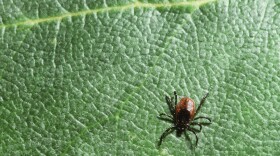-
Certain invasive plants, like Japanese barberry, provide habitat for ticks. New research aims to determine how much cutting down on these invasive species could reduce the risk of tick-borne diseases.
-
Climate change is bringing more ticks and tick-borne disease to Vermont. But it’s not the full storyIn recent decades, tick populations have boomed in Vermont and other Northeastern states — as have tick-borne diseases like Lyme. Scientists say climate change is one piece of the puzzle, but it’s not the only thing driving the expansion of their range.
-
Once called Nantucket fever, the tick-borne illness babesios is spreading from the Northeast into the Midwest. A clinical trial starts this month to see if an anti- malaria drug can treat the disease.
-
A researcher explains the spread of blacklegged ticks in the northeast and their role in Lyme disease transmission.
-
The Vermont Department of Health is seeing an increase in tick-related emergency room visits in the last couple weeks. Here's what Vermonters should look out for and how they can protect themselves.
-
Blacklegged ticks, the arachnids that carry Lyme disease, are out and about for more of the year thanks to warming temperatures across much of the country. Here's how to stay safe.
-
Scientists at the Maine Medical Center Research Institute's Vector-Borne Disease Lab are conducting studies to better understand how the Powassan virus spreads among ticks.
-
We look at the growth of Lyme and other tick-borne illnesses in Vermont. We hear the stories of people who have been affected by Lyme and struggled to return to good health.
-
NPR's Lulu Garcia-Navarro speaks to professor Lee Ann Sporn of Paul Smith's College in upstate New York about tick-born diseases and how to avoid them this summer.
-
If you think you’re noticing more ticks than normal this spring, you may be on to something. But fear not, because these aren’t the ticks that carry...
Vermont Public is independent, community-supported media, serving Vermont with trusted, relevant and essential information. We share stories that bring people together, from every corner of our region. New to Vermont Public? Start here.
© 2026 Vermont Public | 365 Troy Ave. Colchester, VT 05446
Public Files:
WVTI · WOXM · WVBA · WVNK · WVTQ
WVPR · WRVT · WOXR · WNCH · WVPA
WVPS · WVXR · WETK · WVTB · WVER
WVER-FM · WVLR-FM · WBTN-FM
For assistance accessing our public files, please contact hello@vermontpublic.org or call 802-655-9451.
© 2026 Vermont Public | 365 Troy Ave. Colchester, VT 05446
Public Files:
WVTI · WOXM · WVBA · WVNK · WVTQ
WVPR · WRVT · WOXR · WNCH · WVPA
WVPS · WVXR · WETK · WVTB · WVER
WVER-FM · WVLR-FM · WBTN-FM
For assistance accessing our public files, please contact hello@vermontpublic.org or call 802-655-9451.
Play Live Radio
Next Up:
0:00
0:00
Available On Air Stations








